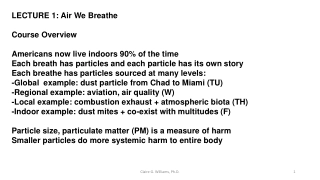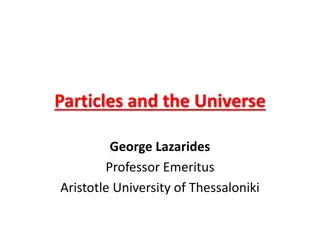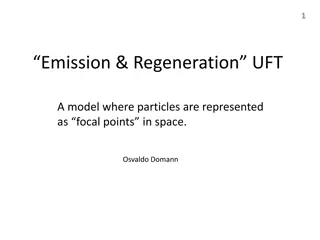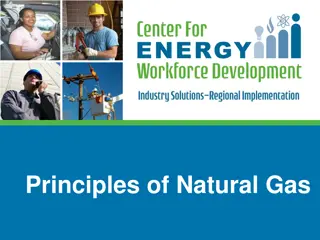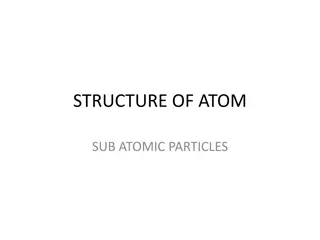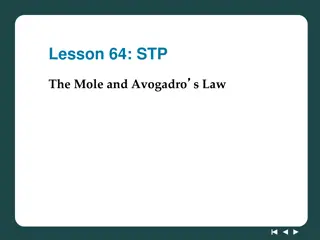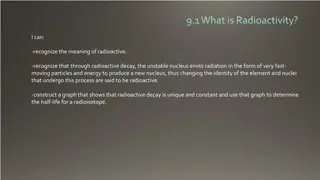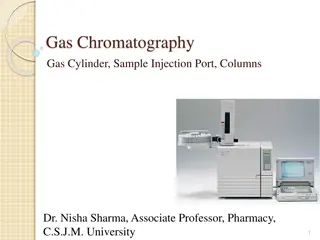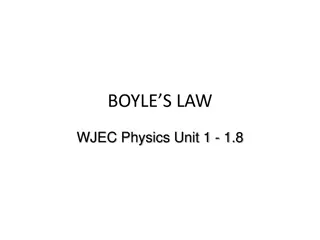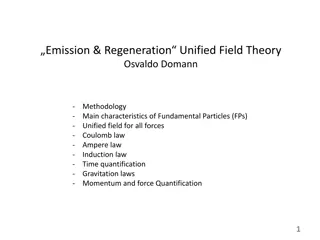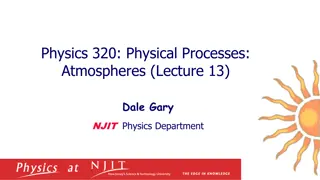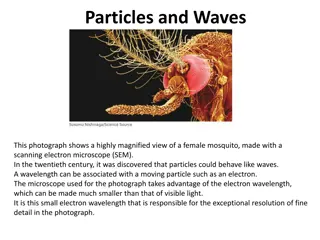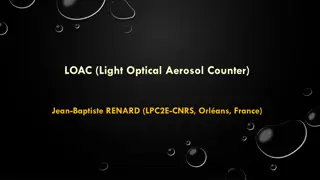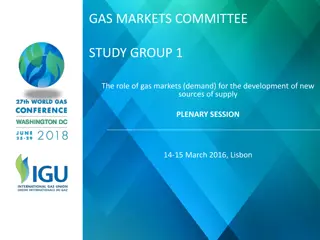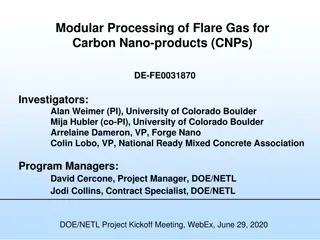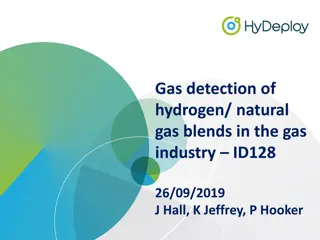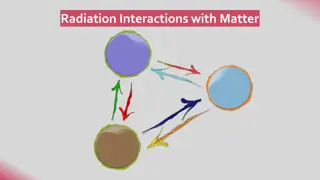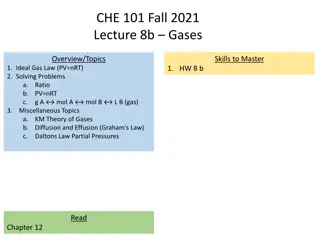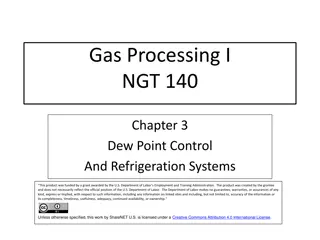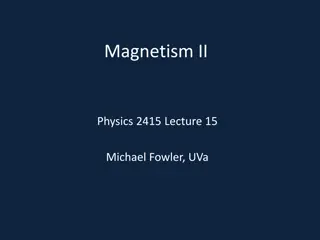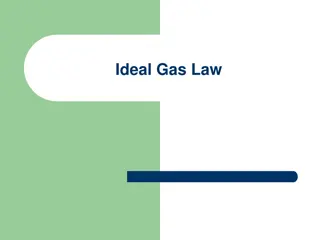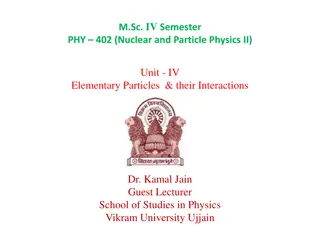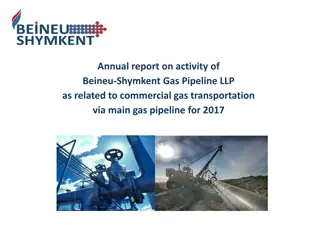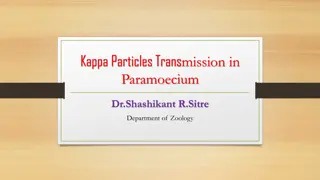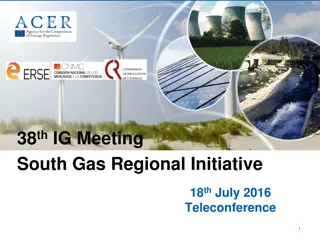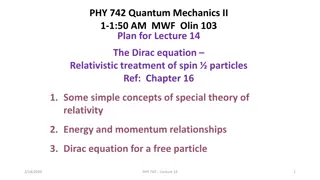Gas meters market
A gas meter is driven by the force of the moving gas in the pipe. Each time the dial with the lower value complete one revolution, the pointer on the next higher value dial moves ahead one digit. These meters are essential for ensuring adequate gas pressure from the main supply of natural or liquefi
2 views • 6 slides
LECTURE 1: Air We Breathe Course Overview
Americans predominantly spend 90% of their time indoors, where each breath taken contains particles sourced from various levels - global, regional, local, and indoor sources. These particles, known as particulate matter (PM), can have differing effects on the body based on their size, with smaller p
2 views • 18 slides
Understanding Radioactive Decay and Nuclear Radiation
Radioactive decay is the process in which unstable atomic nuclei emit charged particles and energy, transforming into different elements. This process involves the emission of alpha particles, beta particles, and gamma rays. Alpha particles consist of two protons and two neutrons, beta particles are
4 views • 31 slides
Exploring Particles and Fundamental Interactions in the Universe
Delve into the intricate world of particles and fundamental interactions in the Universe as explained by Professor Emeritus George Lazarides from Aristotle University of Thessaloniki. Discover the structure of matter, classification of particles based on interactions, constituents of hadrons, conser
1 views • 36 slides
Exploring Dark Sector Particles at Fermilab PIP-II and Beyond
The DAMSA experiment at Fermilab PIP-II aims to search for Dark Sector Particles (DSP) using a high-intensity proton beam facility. By focusing on Axion-like particles and employing specific physics strategies, DAMSA seeks to penetrate the low mass regime and discover rare particles in unexplored ki
6 views • 22 slides
Understanding the States of Matter: Solids, Liquids, and Gases
Matter is anything that occupies space and has mass, consisting of tiny particles like atoms and molecules. Solids have closely packed particles, liquids have less densely packed particles that can flow, and gases have spread out particles. Solids retain their shape, liquids take the shape of their
6 views • 11 slides
Understanding Radioactivity and its Particles in Radiochemistry
Radioactivity involves the spontaneous decay of unstable atomic nuclei, releasing radiation in the form of alpha particles, beta particles, and gamma rays. Alpha particles are heavy and have low penetration, beta particles are light and faster, while gamma rays are high-energy waves with great penet
0 views • 20 slides
Realistic Particle Representations and Interactions in Emission & Regeneration UFT
The presentation explores a model in which particles are depicted as focal points in space, proposed by Osvaldo Domann. It delves into theoretical particle representations, motivation for a new approach, and the methodology behind the Postulated model. Additionally, it delves into particle represent
1 views • 24 slides
Understanding Natural Gas: Properties, Dangers, and Safety Measures
Explore the principles of natural gas, its chemical composition, properties, and potential dangers. Learn about gas formation, extraction, and usage. Discover how to manage gas leaks, prevent ignition, and ensure safety in handling natural gas. Gain insights into flammability, static electricity ris
0 views • 15 slides
Exploring the Nature of Subatomic Particles and Light
Explore the intricate world of subatomic particles such as electrons, protons, and neutrons, and delve into the dual nature of light as both particles and waves. Discover the structure of atoms, their isotopes, atomic number, mass number, and the fundamental discoveries in the field of physics, incl
0 views • 16 slides
Understanding the Mole and Avogadro's Law at Standard Temperature and Pressure (STP)
The lesson delves into the concepts of mole and Avogadro's law in relation to gases at standard temperature and pressure (STP). It explains how chemists track the number of gas particles using the mole unit, and highlights the significance of STP in gas calculations. Equal volumes of gases contain e
0 views • 9 slides
Understanding Radioactivity and Nuclear Radiation
Radioactivity is the process in which unstable nuclei emit radiation, such as alpha, beta, or gamma particles, to become stable. This emission can change the element's identity and is crucial in fields like nuclear power and understanding Earth's core heat source. Different radioactive isotopes like
0 views • 12 slides
Gas Chromatography Equipment Overview: Components and Functions
Gas chromatography involves various components like gas cylinders, sample injection ports, and columns. The gas cylinder serves as a carrier gas reservoir with a pressure regulator. Sample introduction is through a column inlet/sample port injector. The GC injection syringe helps vaporize samples qu
0 views • 16 slides
Understanding Boyle's Law in Physics
Boyle's Law explains the relationship between the volume and pressure of a gas. When pressure increases on a fixed mass of gas at constant temperature, the volume decreases. This inverse proportion between pressure and volume can be explained by the Kinetic Theory, where the speed of gas particles a
0 views • 12 slides
Unified Field Theory of Fundamental Particles by Osvaldo Domann
Methodology, characteristics, and interactions of Fundamental Particles (FPs) in the Unified Field Theory proposed by Osvaldo Domann are explored. The theory covers the unified field for all forces, quantum laws, momentum quantification, and more. It introduces the concept of Fundamental Particles m
0 views • 21 slides
Understanding Atmospheric Physics: Ideal Gas Law and Maxwellian Distribution
Exploring the physics of gases in planetary atmospheres, this lecture delves into the ideal gas law which relates pressure, density, and temperature in an atmosphere. It introduces the concept of kinetic temperature and Maxwellian distribution, showcasing how gas particles distribute in equilibrium.
0 views • 12 slides
Exploring the Dual Nature of Particles and Waves in Physics
This collection of images and information delves into the intriguing concept of the dual nature of particles and waves in the field of physics. From the historic Young's double-slit experiment demonstrating the wave nature of light to Louis de Broglie's groundbreaking work assigning a wavelength to
2 views • 15 slides
Best Gas Dryer Services in Bickford Park
If you want the Best Gas Dryer Services in Bickford Park, visit AG Gas Solutions. They specialize in a wide range of services including gas stove repair, gas ranges, gas ovens, gas dryers, gas BBQs, gas pizza ovens, gas fire pits, pool heaters, dryer
1 views • 6 slides
Light Optical Aerosol Counter (LOAC) Project Overview
Light Optical Aerosol Counter (LOAC) is a project led by Jean-Baptiste Renard in France, involving a collaboration between research institutions, private companies, and the French Space Agency. The LOAC instrument, weighing 1 kg, is used with meteorological balloons to measure concentrations of aero
0 views • 21 slides
Understanding Real Gas Behavior in Chemistry
Real gases deviate from ideal gas behavior due to factors like finite volume of gas particles and intermolecular attractions. At high pressures and low temperatures, real gases don't follow ideal gas laws, impacting their molar volume and pressure calculations. This deviation is crucial in analyzing
1 views • 11 slides
Gas Markets Committee Study Group: Fueling the Future with Gas
The Gas Markets Committee Study Group 1 focuses on analyzing the role of gas markets in driving the development of new sources of supply, studying gas demand globally and in selected countries, and projecting gas supply up to 2040. The group discusses gas demand drivers, shares work progress through
0 views • 9 slides
Sustainable Conversion of Flare Gas into High-Value Carbon Nano-products
This project focuses on modular processing of flare gas to produce carbon nano-products, aiming to address the challenges of natural gas flaring in the United States. With a three-year timeline and a total budget of $3,750,000, the interdisciplinary team led by the University of Colorado Boulder see
0 views • 36 slides
Gas Detection of Hydrogen/Natural Gas Blends in the Gas Industry
Gas detection instruments play a crucial role in assessing the presence of hazardous atmospheres in the gas industry. This study focuses on the impact of adding hydrogen up to 20% in natural gas blends on gas detection instruments. The aim is to understand any potential inaccuracies in readings and
0 views • 30 slides
Understanding Ionizing Radiation and Its Interactions with Matter
Ionizing radiation interacts with matter in direct and indirect ways, leading to various effects on biological systems. Directly ionizing particles disrupt atomic structures, while indirectly ionizing radiation like electromagnetic waves produce secondary electrons. Alpha particles have high ionizat
0 views • 22 slides
Understanding Neutralization of Proton Beam Using Charge Exchange Cell in COMSOL
In various applications, collisions of neutral particle beams with target materials play a crucial role. This process involves neutralizing high-velocity proton beams by passing them through a charge exchange cell filled with neutral gas, such as argon. The cell allows protons to capture electrons f
0 views • 17 slides
Neutralization of Proton Beam Through Charge Exchange Cell
Collisions between neutral particle beams and target materials at varying projectile energies play a crucial role in numerous applications. Charge exchange cells facilitate the generation of high-velocity neutral particles by neutralizing fast ions within a high-density gas region. By capturing elec
0 views • 15 slides
Gas-Electric Working Group Meeting Highlights - July 15, 2022
Gas-Electric Working Group meeting on July 15, 2022, discussed topics including Antitrust Admonition, Gas Industry Changes under new Texas RRC Regulations, Critical Designation of Natural Gas Infrastructure, Supply Chain Mapping, Gas-Electric Load Coordination Process, and introduction of James Stev
0 views • 21 slides
Understanding Dynamics of Connected Particles in Physics
Delve into the world of connected particles in physics with a focus on tow bars, forces, and Newton's laws. Explore problems involving connected particles moving in the same direction and analyze scenarios like towing cars along a road. Gain insights into tension, accelerations, resistances, and for
0 views • 14 slides
Comprehensive Overview of Ideal Gas Law and Gas Problems
Delve into a detailed exploration of the Ideal Gas Law and its applications in solving various gas-related problems. Master the concepts of Boyle's Law, Charles's Law, Avogadro's Law, and more through equation, ratio, and stoichiometry problems. Enhance your understanding of gas behavior and calcula
0 views • 20 slides
Gas Processing: Dew Point Control and Refrigeration Systems
Gas processing involves gathering raw gas from wells, passing it through various units like feed gas receiving, condensate stabilization, gas treating, dew point control, and refrigeration units to control liquid condensation and recover natural gas liquids. Dew point control helps prevent condensat
0 views • 26 slides
Understanding Radiation and Its Effects on Health
Radiation is a form of energy that can be emitted from radioactive materials in the form of particles or waves. It can be either ionizing or non-ionizing, with ionizing radiation having the ability to penetrate tissues and deposit energy within them. While alpha particles, beta particles, x-rays, an
1 views • 38 slides
Understanding Magnetism: Forces, Fields, and Applications
Explore the fascinating realm of magnetism in Physics as you delve into topics such as forces on charged particles, path of particles in magnetic fields, torque on current loops, and Earth's magnetic field alignment. Learn about the force on straight wires and electric charges in magnetic fields, an
0 views • 14 slides
Understanding the Ideal Gas Law in Chemistry
Exploring the concept of the Ideal Gas Law, its derivation from the combined gas law, conversion of pressures, practical applications through problem-solving examples, and the significance of the gas constant (R) in calculations. Learn how to use the Ideal Gas Law formula (PV = nRT) to solve for var
0 views • 19 slides
Gas Laws Review Game - Test Your Knowledge on Gas Concepts and Mixed Gas Laws
Get ready to test your knowledge on gas concepts and mixed gas laws with this interactive review game. Answer questions on gas properties, volume changes, pressure variations, and more. Challenge yourself and your team members as you solve problems related to gas laws. Improve your understanding and
0 views • 7 slides
Understanding the Impact of Ultra-High Energy Particles on Biological Systems
Ultra-high energy particles from outer space create Extended Air Showers (EAS) when interacting with Earth's atmosphere, leading to the formation of dense cores emitting radiation. These particles can affect biological organisms, memory storage, and health risks, with implications for medical resear
0 views • 5 slides
Exploring Elementary Particles and Their Interactions in Nuclear and Particle Physics
Delve into the fascinating world of elementary particles, where quarks form the basis of protons and neutrons in the nucleus, alongside electrons. Discover a diverse array of particles such as muons, neutrinos, and quarks, each with unique properties of charge and mass. Uncover the significance of t
0 views • 10 slides
Annual Report on Activity of Beineu-Shymkent Gas Pipeline LLP for Gas Transportation in 2017
The annual report highlights the commercial gas transportation activities of Beineu-Shymkent Gas Pipeline LLP in 2017. It provides general information on the project, technical parameters of the gas pipeline, and a diagram of the Beineu-Bozoy-Shymkent Gas Pipeline. The report also includes details o
0 views • 14 slides
Understanding Kappa Particles Transmission in Paramecium
Research by Dr. Shashikant R. Sitre delves into the transmission of kappa particles in Paramecium, revealing the presence of these cytoplasmic particles in specific strains. The interaction between killer and sensitive strains, controlled by the dominant K gene, sheds light on cytoplasmic heredity a
0 views • 10 slides
Meeting Summary: Interoperability and Gas Quality in Gas Regional Initiative
Discussion highlights from the 38th IG Meeting of the South Gas Regional Initiative teleconference held on July 18, 2016. Focus on interoperability, latest developments, and next steps in the region. Key topics include Interconnection Agreement requirements, gas flow control, gas quantity allocation
0 views • 24 slides
Relativistic Treatment of Spin Particles: Dirac Equation & Special Relativity
Exploring the Dirac equation for spin particles within the framework of special theory of relativity. Topics covered include energy-momentum relationships, basics of special relativity, Lorentz transformations, and relativistic effects on particles. The lecture delves into the interplay between quan
0 views • 23 slides

